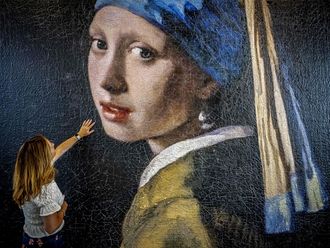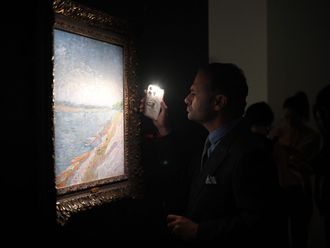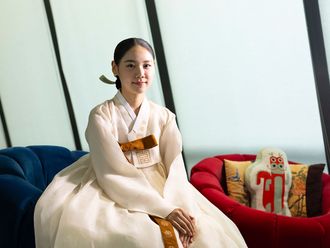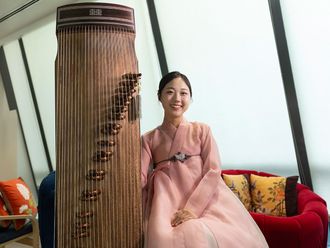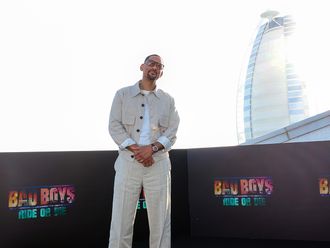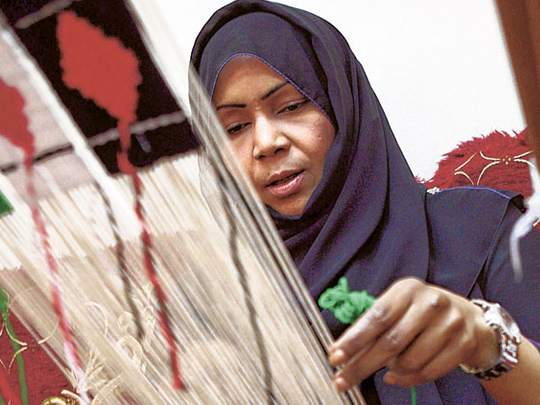
Abu Dhabi: The Abu Dhabi Authority for Culture and Heritage (Adach) has announced that the traditional UAE Sadu has become the new addition to the Unesco List of the Intangible Cultural Heritage of Humanity.
Shaikh Sultan Bin Tahnoun Al Nahyan, Chairman of Adach, said the efforts to register Sadu, the skills of traditional weaving in the UAE, that needs urgent safeguarding, in Unesco's list had borne fruit.
Sadu is a form of weaving done by women in the rural communities which is used in fine furniture and decorative accessories for camels and horses. Men remove the wool of sheep, camels and goats, which is then cleaned and prepared by women. The wool is spun and then dyed and woven on a loom. The traditional colours include black, white, brown, beige and red. Distinctive geometric designs are employed when spinning the wool.
Weavers gather in small groups and begin spinning and weaving while talking about family events, and sometimes they sing or recite poems.
These meetings are traditional means for teaching this craft, where girls learn by watching. Girls are assigned some tasks such as sorting wool, before learning more complex skills.
Sixth session
The Unesco announcement was made on Friday during the sixth meeting of the Intergovernmental Committee for the Safeguarding of the Intangible Cultural Heritage, which is currently holding its sixth session in Bali, Indonesia.
The inclusion of Sadu in the Unesco list will help enhance the sustainability of the traditional craft, and casts light on the intangible heritage of the UAE and promotes cultural diversity and human creativity worldwide, said Shaikh Sultan.
The UAE application was presented to Unesco as an initiative of Adach, with support from the Ministry of Culture, Youth and Community Development, Permanent Delegation of the UAE to Unesco, and a number of ministries, municipalities, relevant organisations and associations and non-governmental organisations.
Mohammad Khalaf Al Mazroui, Adviser for Culture and Heritage at the Court of the Crown Prince of Abu Dhabi and Director General of Adach, said Abu Dhabi and the UAE, through such a registration, pursued their achievements in the field of preservation of cultural tangible and intangible heritage.
Enhancing identity
"In cooperation with a number of the concerned official agencies, Adach succeeded in November 2010 to register falconry on Unesco's Representative List of the Intangible Cultural Heritage of Humanity.
"It also succeeded in having the City of Al Ain inscribed on Unesco's tangible heritage list in June 2011. It also prepared two international files in cooperation with the Sultanate of Oman to register ‘Iyala' and ‘Taghrouda' on the Representative List of Intangible Cultural Heritage. The two files are expected to be examined next year, 2012," said Al Mazroui.
The Director General of Unesco, Irina Bokova, said that each country whose heritage is registered at Unesco should be proud of this, as it promotes and enhances the identity of the citizens of the state.
‘Pride of nations'
"Heritage is the pride of nations, communities and groups, because it creates respect, understanding and peace among people and helps them achieve sustainable development.
"Preservation does not mean freezing heritage, but rather means the transfer of knowledge, skills, meanings and values from a generation to another, which is the focus of the Unesco Convention for 2003," said Bokova.
A total of 29 nominations were received from around the world, and the advisory body of Unesco agreed only to 12 files and rejected 11 others, while six countries withdrew their nominations.


